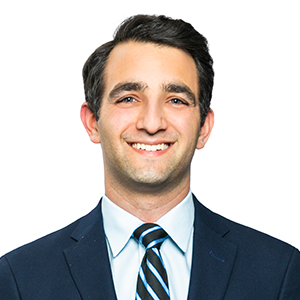 The industry event anyone in secured finance attends now celebrates its 77th year. SFNet is set to make the Arizona convention a memorable one. Click below to register.
The industry event anyone in secured finance attends now celebrates its 77th year. SFNet is set to make the Arizona convention a memorable one. Click below to register.

Zack Schwartz
Vice President, CIT
Zack Schwartz is a vice president at CIT, a division of First Citizens Bank, where he serves as an underwriter and portfolio manager of middle-market asset-based loans. He began his career at CIT in 2015 in the credit training program and has risen swiftly through the ranks since. Zack’s primary focus is on the commercial and industrial sector, where he has underwritten senior debt financings for a wide array of transactions including leveraged buyouts, working capital, recapitalizations, and restructurings. Zack has also been instrumental in building and developing CIT’s specialty lender finance practice to where it currently sits with over $1 billion in commitments to BDCs and private investment firms. Zack also manages a portfolio of $400 million, including agented and sole lender transactions. A mentor in the firm, Zack runs training sessions for new hires on proprietary credit models and pipeline management software.
Zack holds a Bachelor of Arts in economics from the University of Pennsylvania and a Master of Business Administration from Columbia University, where he graduated with Dean’s Honors in May 2022. He currently resides in Brooklyn, NY.
What is the best professional advice you have been given, and how have you implemented it?
A manager once told me to never raise a problem without presenting a possible solution. This might not always seem possible, but the idea behind this advice is that your solution only has to be a first step to starting the conversation on how to fix an issue. Instead of simply bearing the bad news, bring the first idea for how to turn a loss into a win. Suggest an idea that sparks a brainstorm and ultimately gets to the ideal answer.
To me, this touches on the heart of teamwork and responsibility. No matter the cause of the negative situation, the most important thing is to clearly communicate the problem and jump in with a possible solution that demonstrates your commitment and determination to fix it. Become the problem solver.
I implement this practice by thinking creatively and approaching any conflict from a 360-degree view. The more I do this, the easier it seems. Soon even the biggest problems won’t seem so daunting because you will become well-trained in working to find the solutions from the start.
What advice do you normally give to the junior talent you mentor?
My advice is to say yes to as many new opportunities as you can and always be eager to learn.
As a young professional, it can be nerve-wracking to be assigned a project you haven’t dealt with before. The natural tendency might be to shy away from challenges in favor of more comfortable tasks. I always want my junior talent to view an unfamiliar task as an opportunity to grow. Learning from experience is a crucial part of professional development and helps to develop an intuition for your work. Every new project presents a chance to learn, both from the experience and the expertise of senior team members.
It is important to ask questions and demonstrate an interest in learning about your role, company and industry. You’re not expected to know everything immediately. Seek out mentors and be useful in any way you can. Be available for calls or meetings. Jump in with a positive attitude when you’re asked to help. Being excited and eager to learn is a simple yet incredibly effective way to gain trust and develop a good reputation in your organization. That effort never goes unnoticed.
With many working remotely or hybrid-style the past few years, what are some work-life balance strategies you’ve stuck with?
Learning to cook has kept me balanced while working from home. When my kitchen table took on the unexpected role of boardroom table, it was all too easy to let work hours bleed into my home life. When remote classes for my MBA program began (nearly every Saturday for two years), I quickly realized that if I didn’t carve in specific moments for myself, I would burn out worse than any cooking-related mishap ever could.
You need to eat dinner every day and you need a moment away from daily responsibilities to de-stress and unplug. I discovered that I could satisfy both these requirements by taking time to cook something healthy and delicious. Whether it was a quick meal or an hour-long recipe, I found it peaceful to clear my head and let my mind wander as I cooked, especially when I couldn’t physically wander out of the house. Cooking allows me to be creative every day and brings a sense of accomplishment, providing me with both a balanced meal and a balanced mind in a time I needed it most.
77th Annual Convention
 The industry event anyone in secured finance attends now celebrates its 77th year. SFNet is set to make the Arizona convention a memorable one. Click below to register.
The industry event anyone in secured finance attends now celebrates its 77th year. SFNet is set to make the Arizona convention a memorable one. Click below to register.
